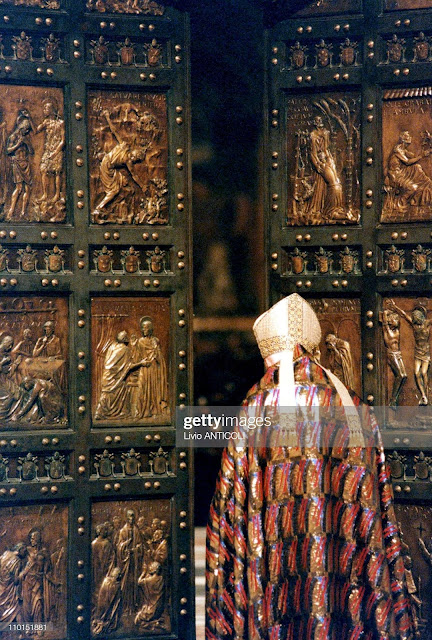Once in Six Millennia: The Momentous Year 2000
 |
| Pope John Paul II adorned with the Jubilee Vestment opens the Holy Door of St. Peter's Basilica on December 24th, 1999 to usher in the Great Jubilee Year. Photo By Livio Anticoli through Getty Images |
I vividly remember the 29th day of February, 2000, because something so distinct happened. The perfect cone-shaped Mayon Volcano we peer on every now and then erupted destructively.
As a local, I'm blessed with the views of its beauty and enigma it effervescently possesses. It wasn't something I could get used to as she changes appearance depending on the circumstance --- the time of day, weather, or one's location.
Even more so magnificent is its appearance on extreme conditions --- during eruptions. And so, when it erupted on a day that doesn't come in every four years, it left a memory I would remember all my life.
But unbeknownst to my young self then was that, that day wouldn't come in another six millennia...
For the Catholics, 2000 was the Great Jubilee Year. For the Chinese, it was the Year of the Golden Dragon. As if the titles of nobility would end there. It's actually as controversial as the left and right of the political spectrum. For some, it was the beginning of the Third Millennium. For others, it was the last of the previous one.
Aside from the above matters that make that year special, it has no equivalent - in terms of distinctions - in another 6000 years.
Let us dissect everything about 2000.
First, it ends with three 0s. Second, it was a leap year. One would argue that this is something that happens once every one thousand years. Unfortunately, that is not true because the year 3000 will not be a leap year.
A simple explanation can be had by understanding how the planet Earth revolves around the sun and, frankly, I couldn't explain it any better than Bob Craddock of Center for the Earth and Planetary Studies does ---
A calendar year is typically 365 days long. These so called “common years” loosely define the number of days it takes the Earth to complete one orbit around the Sun. But 365 is actually a rounded number. It takes Earth 365.242190 days to orbit the Sun, or 365 days 5 hours 48 minutes and 56 seconds. This “sidereal” year is slightly longer than the calendar year, and that extra 5 hours 48 minutes and 56 seconds needs to be accounted for somehow. If we didn’t account for this extra time, the seasons would begin to drift. This would be annoying if not devasting, because over a period of about 700 years our summers, which we’ve come to expect in June in the northern hemisphere, would begin to occur in December!
By adding an extra day every four years, our calendar years stay adjusted to the sidereal year, but that’s not quite right either. Some simple math will show that over four years the difference between the calendar years and the sidereal year is not exactly 24 hours. Instead, it’s 23.262222 hours. Rounding strikes again! By adding a leap day every four years, we actually make the calendar longer by over 44 minutes. Over time, these extra 44+ minutes would also cause the seasons to drift in our calendar. For this reason, not every four years is a leap year. The rule is that if the year is divisible by 100 and not divisible by 400, leap year is skipped. The year 2000 was a leap year, for example, but the years 1700, 1800, and 1900 were not. The next time a leap year will be skipped is the year 2100.
And why is it called “leap year?” Well, a common year is 52 weeks and 1 day long. That means that if your birthday were to occur on a Monday one year, the next year it should occur on a Tuesday. However, the addition of an extra day during a leap year means that your birthday now “leaps” over a day. Instead of your birthday occurring on a Tuesday as it would following a common year, during a leap year, your birthday “leaps” over Tuesday and will now occur on a Wednesday.
And if you happen to be born on leap day February 29, that doesn’t mean you only celebrate a birthday every four years. Every three years, you get to celebrate your birthday on March 1 and continue to grow old like the rest of us.
Thanks to leap year, our seasons will always occur when we expect them to occur, and our calendar year will match the Earth’s sidereal year.
Following the nature of earth's revolution around the sun, a leap year that ends with '000' will not be around until the year 4000. Grab your calculators and see if 3000 is divisible by 400.
However, the year 2000 is more special than 4000 if you are Chinese because 4000 will be the Year of the Golden Rat while 2000 was the Year of the Golden Dragon. Neither will 6000 be as special, for it will be the Year of the Golden Monkey. The next Year of the Golden Dragon that ends with '000' that is also a leap year will be the year 8000 --- or another six millennia from now...
How would I describe that fateful day of 29th of February 2000? A lofty ash cloud came out of the volcano around midday, which was something whose grandeur could not be matched by its more recent eruptions. As time went on, Mayon's eruptions would be less and less spectacular ever since. And so, I would ardently remember that day all my life...










Comments
Post a Comment